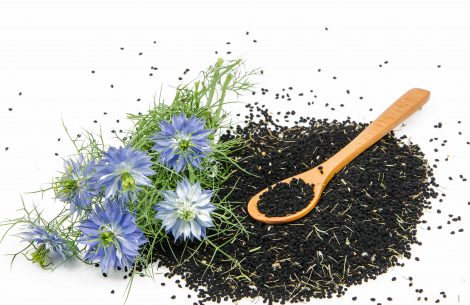Nigella Sativa is a plant with small black seeds often used as spice, but has a wealth of possibilities for health improvement.
Dozens of academic papers have lauded the benefits of the black seed oil, made from the medicinal plant known as Nigella sativa (the Ranunculaceae family), also known as black cumin, and used primarily in Middle East and Asian countries.
Nigella sativa has been embraced for its aroma and flavor as a spice for centuries. In Avicenna’s Cannon of Medicine, the books of the Persian philosopher, it is listed as having been “widely investigated for its biological activities and restorative potential and demonstrated to have a wide range of activities.”
Another description in an academic paper: “Due to its miraculous power of healing, N. sativa has gotten a place among the top-ranked evidence based herbal medications.”
A wide-range of activities, indeed!
About Nigella sativa
Nigella sativa is a herbaceous plant that belongs to a family of flowering plants and commonly used in natural food. It is an annual plant, with straight leaves and tall. The delicate flowers have various colors of white, yellow, pink, blue or purple. The natural fruit contains numerous seeds.
Its Actions
Various studies have linked Nigella sativa to being used for anti-inflammatory, anti-bacterial and anti-hypertensive conditions. It is also used to thwart diabetes and skin disorders. Additionally, It is considered an aid for the liver, helpful in digestion and helps to stimulate the appetite. Researchers also have credited nigella sativa with reducing cholesterol and for maintaining weight control. It also has been beneficial for a variety of nervous system ailments, and has neurological impacts, including its ability to improve memory, in animal studies.
Pancreatic cancer study
The herb has many attributes, and Nigella sativa helps treat a broad array of diseases, including immunity and inflammatory disorders, said Hwyda Arafat, MD, PhD, associate professor of Surgery at Jefferson Medical College of Thomas Jefferson University in a statement.
The herb may help in fighting pancreatic cancer, one of the most difficult cancers to treat, according to the researchers at the Kimmel Cancer Center at Jefferson Hospital in Philadelphia. In a study, they found that the extract of Nigella sativa seed oil blocked pancreatic cancer cell growth and killed the cells by enhancing the process of what is known as “programmed cell death,” according to a hospital statement.
Thymoquinone abstract
Previous studies also have shown, from the seed extracts, anticancer activity in prostate and colon cancers, and antioxidant and anti-inflammatory effects, the hospital said. The abstract, thymoquinone, “could eventually have some use as a preventative strategy in patients who have gone through surgery and chemotherapy or in individuals who are at high risk of developing cancer,” the hospital said. Pancreatic cancer is often detected after it has spread. Research is vital: about 4 percent of people with pancreatic cancer live for five years after diagnosis, according to the hospital.
The presence of thymoquinone as its active chemical component is a key factor in the seeds’ benefits. The compound contains what researchers have described anti-inflammatory, anti-cancerous and antioxidant properties. The seeds also contain proteins, including two different types of alkaloids and alpha-hederin.
“The original research articles published so far have confirmed the pharmacological potential of N. sativa seeds, its oil and extracts and some of its active principles,” according to researchers at the Asian Pacific Journal of Tropical Biomedicine. The seeds “possess remarkable in vitro and in vivo pharmacological activities against a large variety of diseases and found to be relatively safe,” the researchers said.
They add: “Further investigations are required to study the mechanism of actions of N. sativa seeds and its constituents by which they exert their therapeutic effects. N. sativa seeds, its oil, constituents of N. sativa sees like TQ, alpha-hederin or others could be used in suitable combinations with existing chemotherapeutic agents for an effective treatment of many infectious diseases and to overcome the resistance problem.”
A variety of recipes
The oil can be used in all kinds of recipes, including soups and stews and tea latte. It also can be tapped for skin treatment, with other soothing products such as coconut oil. The oil also can be added to hair shampoo or conditioner.
References:
- Beheshti, F, Khazaei, M et al. Neuropharmacological effects of Nigella sativa. Avicenna Journal of Phytomedicine. 2016. Jan-Feb. 6 (1): 104-2016. PMC4884225. s://www.ncbi.nlm.nih.gov/pmc/articles/PMC4884225/
- Ahmad, A, Husain, A, et al. A review on therapeutic potential of Nigella sativa: A miracle herb. Asian Pacific Journal of Tropical Biomedicine. 2013. May: 3 (5): 337-352. Doi: 10.1016/S2221-1691(13)60075-1
- Press Release. Kimmel Cancer Center, Jefferson Hospital, Philadelphia, Pa. Traditional Herbal Medicine Kills Pancreatic Cancer Cells, Kimmel Cancer Center at Jefferson Researchers Report. 2008. Retrieved from: http://blog.kimmelcancercenter.org/?p=103
- Dr. Jonathan Miller. 2014. Nigella sativa, a true ‘wonder medicine’?Labio Light Natural Health. Retrieved from: https://www.lapislight.com/wp/nigella-sativa-wonder-medicine/
- Dr. Josh Axe, DC, DMN, CNS. 2014. 9 Proven Black Seed Oil Benefits that Boost Your Health. Retrieved from: https://draxe.com/black-seed-oil-benefits/
- Rachael Link, MS, RD. 2018. 9 Impressive Health Benefits of Kalonji (Nigella Seeds). Retrieved from: https://www.healthline.com/nutrition/kalonji-nigella-seeds#section3

